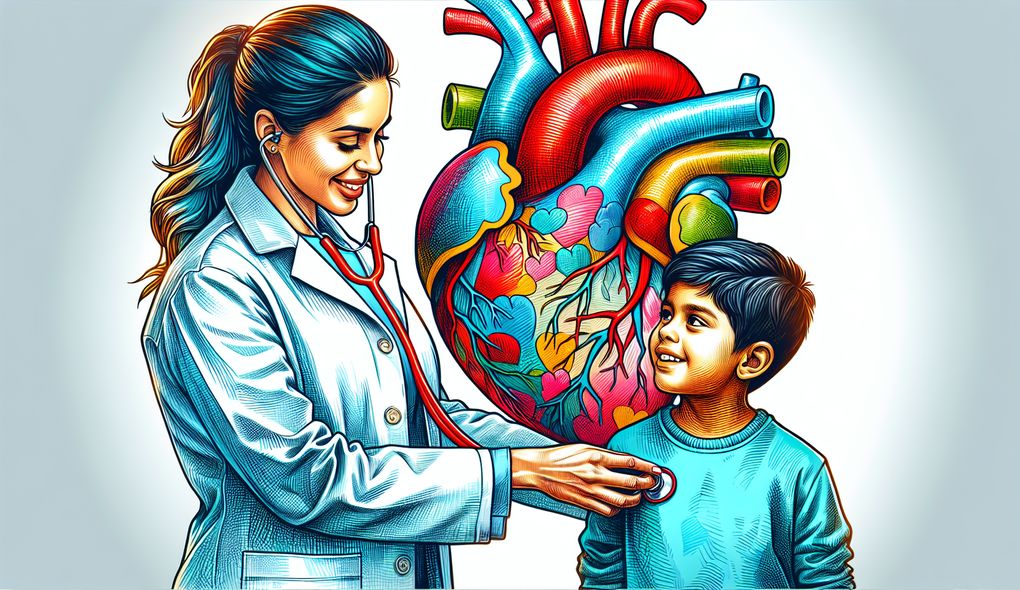Can you provide an example of a time when you used your analytical and problem-solving abilities to diagnose a complex heart condition in a pediatric patient?
INTERMEDIATE LEVEL

Sample answer to the question:
During my time as a Pediatric Cardiologist, I encountered a case involving a 10-year-old patient with a complex heart condition. The patient had been experiencing recurring chest pain, irregular heartbeat, and shortness of breath. To diagnose the condition, I utilized my analytical and problem-solving abilities. I started by conducting a thorough medical history and physical examination. I then proceeded to order various diagnostic tests, including an electrocardiogram (ECG), echocardiogram, and stress test. The results revealed a congenital heart defect known as Tetralogy of Fallot. It was a complex case as there were multiple abnormalities in the heart's structure. To address the condition, I collaborated with a multidisciplinary team, including cardiac surgeons, anesthesiologists, and nurses, to develop a comprehensive treatment plan. The patient underwent successful open-heart surgery to correct the abnormalities. I provided compassionate care and support to the patient and their family throughout the entire process, ensuring they understood the procedure and post-operative care. The patient recovered well and experienced improved heart function and quality of life.
Here is a more solid answer:
As a Pediatric Cardiologist, I encountered a challenging case involving a 10-year-old patient who presented with recurring chest pain, irregular heartbeat, and shortness of breath. Given the complex symptoms, I relied on my strong analytical and problem-solving abilities to determine the underlying cause of the condition. I initiated the diagnostic process by conducting a comprehensive medical history and physical examination. To gain further insights, I ordered specialized cardiac tests, including an electrocardiogram (ECG), echocardiogram, and stress test. The results revealed a complex congenital heart defect known as Tetralogy of Fallot, characterized by multiple structural abnormalities in the heart. Recognizing the significance of this diagnosis, I collaborated closely with a multidisciplinary team comprising cardiac surgeons, anesthesiologists, and nurses. Together, we developed a comprehensive treatment plan tailored to the patient's needs. The patient underwent successful open-heart surgery, during which I played a vital role in ensuring accurate monitoring and coordination among the team. Throughout the entire process, I provided continuous support and education to the patient and their family, addressing their concerns and ensuring their understanding of the procedure and post-operative care. Thanks to our collective efforts, the patient's heart function improved significantly, leading to a substantial enhancement in their quality of life.
Why is this a more solid answer?
The solid answer provides more specific details about the steps the candidate took to diagnose the complex heart condition. It also mentions collaboration with a multidisciplinary team and emphasizes the candidate's role in providing compassionate care to the patient and their family. However, it can still be further improved by providing more specific information about the treatment plan and the candidate's role in conducting post-operative care.
An example of a exceptional answer:
I encountered a particularly challenging case during my time as a Pediatric Cardiologist. A 10-year-old patient presented with persistent chest pain, irregular heartbeat, and shortness of breath. Recognizing the importance of a detailed and analytical approach, I employed my problem-solving abilities to identify the underlying cause. Beginning with a comprehensive medical history and physical examination, I conducted a thorough assessment of the patient's cardiovascular system. Suspecting a complex heart condition, I ordered an array of diagnostic exams, including an electrocardiogram (ECG), echocardiogram, cardiac catheterization, and magnetic resonance imaging (MRI). The extensive evaluation confirmed the diagnosis of a rare and intricate congenital heart defect known as Hypoplastic Left Heart Syndrome. This condition required a meticulous treatment plan involving multiple surgical interventions. Coordinating with a skilled team of cardiac surgeons, radiologists, anesthesiologists, and nurses, we established a tailored approach for the patient's case. I played a pivotal role in the pre-operative planning, facilitating ongoing communication, and ensuring all aspects of care were meticulously coordinated. Additionally, I provided emotional support and education to the patient's family, empowering them to actively participate in the treatment journey. Following the successful surgeries, I diligently monitored the patient's progress, adjusting their medication regimen and collaborating with rehabilitation specialists to optimize their recovery. The patient responded remarkably, and their cardiac function significantly improved, leading to a substantial enhancement in their overall well-being and quality of life.
Why is this an exceptional answer?
The exceptional answer provides even more specific details about the steps taken to diagnose the complex heart condition, including the use of additional diagnostic exams such as cardiac catheterization and magnetic resonance imaging (MRI). It also highlights the candidate's role in pre-operative planning, ongoing communication, medication management, and collaboration with rehabilitation specialists. Furthermore, it emphasizes the significant improvement in the patient's cardiac function and overall well-being. This answer not only showcases the candidate's strong analytical and problem-solving abilities but also demonstrates their ability to coordinate and provide comprehensive care to the patient.
How to prepare for this question:
- Familiarize yourself with various congenital and acquired heart conditions that affect pediatric patients, especially rare and complex cases.
- Stay updated with the latest advancements in cardiac diagnostic equipment and techniques.
- Practice effective communication skills, as you will need to explain complex medical concepts to young patients and their families.
- Develop strong collaborative teamwork skills by seeking opportunities to work with interdisciplinary teams and participating in case discussions.
- Reflect on past experiences where you successfully diagnosed and treated complex heart conditions in pediatric patients. Be prepared to discuss the specific steps you took and the outcomes achieved.
- Research ongoing research and clinical trials in pediatric cardiology to demonstrate your commitment to staying current with advancements in the field.
What are interviewers evaluating with this question?
- Analytical and problem-solving abilities

